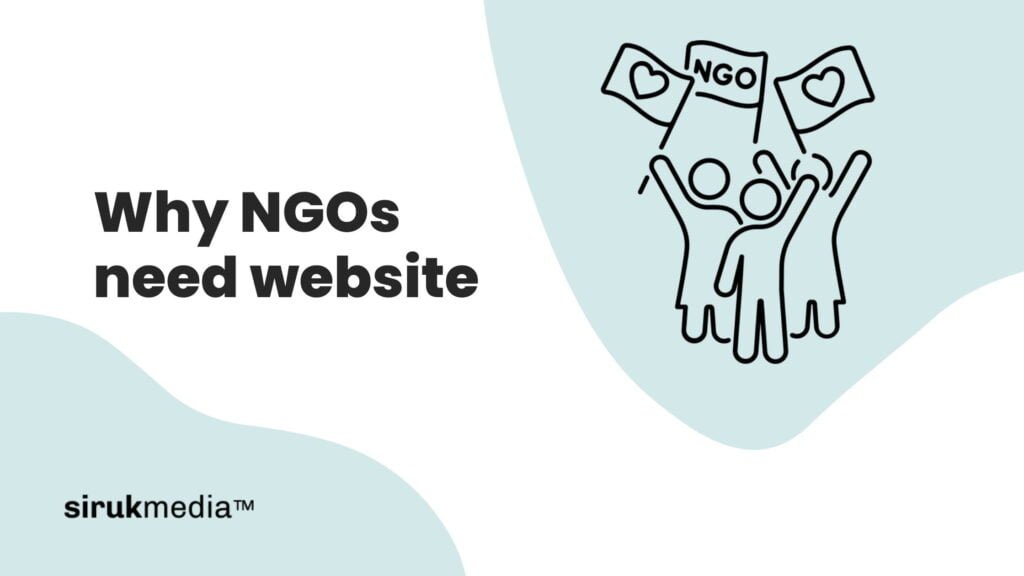Non-governmental organizations (NGOs) play a critical role in tackling global social, economic, and environmental challenges. In today’s digital era, having a strong online presence is essential for NGOs to effectively carry out their missions and engage with their target audience. In this comprehensive blog post, we will delve into the reasons why NGOs need a website, exploring the advantages it brings and how it amplifies their impact in the digital landscape.
- Credibility and Legitimacy: Establishing credibility and legitimacy is paramount for NGOs, as public trust and support are vital for their success. A website serves as a platform for NGOs to communicate their mission, goals, and values to the public. By providing comprehensive information about their work, and showcasing transparency, accountability, and professionalism through details such as contact information, board members, and annual reports, NGOs can build trust and foster strong relationships with donors, volunteers, and beneficiaries.
- Reach and Awareness: Websites enable NGOs to reach a broader audience and raise awareness about their cause. By creating an online presence, NGOs can effectively share information about their programs, projects, and activities. Through search engine optimization (SEO) techniques, NGOs can improve their website’s visibility in search engine results, attracting more organic traffic and increasing their chances of being discovered by individuals interested in supporting their cause. A well-designed and informative website helps NGOs attract new supporters, engage with existing ones, and inspire action toward their mission.
- Fundraising and Donation: Fundraising and donations are critical for NGOs to sustain their operations and carry out impactful programs. A website serves as a powerful tool to facilitate fundraising efforts. NGOs can showcase ongoing campaigns, highlight the impact of previous donations, and provide testimonials from donors, inspiring potential supporters to contribute. By integrating secure online payment gateways directly into their website, NGOs can streamline the donation process, ensuring that funds are received promptly and securely. Websites can also feature recurring donation options, encouraging sustained support from individuals who resonate with the NGO’s mission.
- Engagement and Feedback: Engaging with supporters and receiving feedback is crucial for NGOs to improve their work and build stronger connections with their audience. Websites offer interactive features that enable NGOs to facilitate meaningful engagement and gather valuable insights. By incorporating blog sections, news updates, and success stories, NGOs can share their journey, achievements, and impact with their audience. Websites also provide a platform for supporters to leave comments, ask questions, and offer suggestions, fostering a sense of community and encouraging a two-way dialogue between the NGO and its stakeholders.
- Resource Hub and Knowledge Sharing: NGOs are often repositories of valuable knowledge and resources related to their areas of focus. A website can serve as a centralized hub for sharing information, research, reports, and educational materials. By providing access to such resources through their website, NGOs can contribute to public knowledge, empower individuals to take action and establish themselves as authorities in their respective fields. This not only enhances the NGO’s reputation but also positions them as reliable sources of information and guidance for policymakers, researchers, and the general public.
- Global Reach and Partnerships: In an interconnected world, NGOs have the opportunity to collaborate and form partnerships on a global scale. A website acts as a virtual storefront, showcasing an NGO’s work, values, and impact to potential partners, collaborators, and funders worldwide. It opens doors to new opportunities, helps forge meaningful connections, and facilitates cross-border collaborations that can lead to innovative solutions and greater collective impact.
In the digital age, a website is an indispensable tool for NGOs seeking to make a significant impact. It establishes credibility and legitimacy, expands reach and awareness, streamlines fundraising and donations, fosters engagement and feedback, and serves as a knowledge-sharing platform. NGOs that invest in developing a well-designed and informative website are more likely to attract supporters, engage with their audience effectively, and achieve their mission with greater success. If you are running or planning to start an NGO, prioritize the development of a website to amplify your message, broaden your reach, and catalyze positive change in the world.
